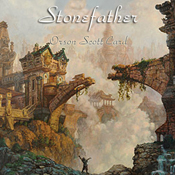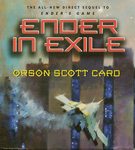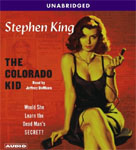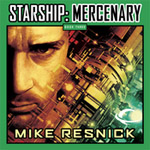
 The Cat Who Walks Through Walls
The Cat Who Walks Through Walls
By Robert A. Heinlein; Read by Tom Weiner
11 CDs – 13.5 Hours [UNABRIDGED]
Publisher: Blackstone Audiobooks
Published: December 2007
ISBN: 1433212918
Themes: / Science Fiction / Marriage / Time Travel / Parallel Worlds / The Moon / Space Station /
When a stranger attempting to deliver a cryptic message is shot dead at his dinner table, Ames is thrown headfirst into danger, intrigue, and other dimensions where Lazarus Long still thrives, where Jubal Harshaw lives surrounded by beautiful women, and where a daring plot to rescue the sentient computer called Mike can change the direction of all human history.
There are a lot of things to dislike about The Cat Who Walks Through Walls:
1. Characters: Heinlein’s characters are either ultra-confident know-it-alls or utterly buffoonish straw-men. Heinlein will happily spend a good ten minutes explaining to you the workings of suborbital flight in a vacuum, but won’t explain (and worse yet – will have the other characters agree) to highly improbable societal systems in cast off sentences like – ‘all sexual options are invested in women’ (on the moon). Then he follows it up with jury trials of accused rapists lasting 30 seconds. Personally, I suspect that any system that threw away habeas corpus in favour of whatever one gender said was good – wouldn’t last very long. It’s possible to imagine a society in which women play a dominant role – but I don’t find it plausible to find any society in which one gender can say one word “rape” (true or not) – and have the accused rapist be instantly ripped apart. Heinlein ignores the problems of: No evidence, no witnesses, no trial. It doesn’t fly Mr. Heinlein.
2. Things missing: First, the internet, especially email, everyone is still mailing paper letters from Lagrange space stations to the Moon! Second, DNA testing. Talk of positively identifying someone all runs along the lines of “fingerprints” and “blood types.” Third, GPS. On Heinlein’s moon you can only tell where you are by using inertial trackers or getting a starfix.
3. A glaring omission: There’s one more thing missing, the last half of the book. Seriously, this book is all prologue, with lots of interesting action, but the entire build up is concluded on the last disc.
4. Too much: There are also things this book has too much of. First, all the many male characters are always calling themselves, denying that they are, or accusing each other of being “henpecked.” This, no matter what universe or era they come from! I’ve never heard any of my married friends use that term. Second, no matter which continent, planet or timeline, the many husbands in this novel come from, they all playfully joke about “beating” their wives. I just don’t know what to do with that information. Is this common in your marriage?
Now, having stated off this review with the above it may sound as if I dislike the novel. And that’s not strictly true. I don’t, not really. But, on the other hand, this is the third audiobook release of it and some of the novelty is starting to wear off. The Cat Who Walks Through Walls has a crackerjack opening scene, some amazing hard SF early on, and a goodly amount of redeeming entertainment value. This is a novel for the truly die-hard Heinlein fans. It was written with the intent of rewarding them for their many years of dedicated reading. It does that. It contains dozens and dozens of characters, many of whom are cameoing from previous Heinlein novels. Lazarus Long (Methusela’s Children), and Hazel Stone (The Rolling Stones) both play substantial roles in the novel. Other characters making appearances include Jubal Harshaw (Stranger In A Strange Land) and Manuel Garcia O’Kelly Davis aka Manny (The Moon Is A Harsh Mistress). In fact, as a reward to loyal readers, The Cat Who Walks Through Walls pairs rather nicely with Heinlein’s The Number Of The Beast in that both it and The Cat Who Walks Through Walls are fond examinations of both the Science Fiction/Fantasy genre and Heinlein’s own career. The key that ties both together is Heinlein’s idea of “pantheistic solipsism.” The idea behind which is that many universes exist under an explanation of ‘the world is myth.’ “The World as Myth” means that influential authors, like L. Frank Baum, Edgar Rice Burroughs, and Heinlein himself are actually creating real parallel universes simply by writing vividly about them. In other words, the fictional stories we really enjoy, ARE ACTUALLY REAL. It’s a neat idea, but it’s better explored in The Number Of The Beast. The Cat Who Walks Through Walls, other than being a rewarding odyssey for fans, is more about marriage than any particular SF idea. Richard Ames gets married in chapter two, and honeymoons on Luna – all the while being chased by assassins and hounded by officious bureaucrats. And that’s where the schism comes in. Heinlein has a no-nonsense, no compromises attitude towards bureaucracy, every situation is black or white. And that holds true for marriage too. Except when it doesn’t. Robert Heinlein Richard Ames will put his foot down, draw a line in the sand, and say “this far no farther”. He’ll hold fast, when confronted by social or bureaucratic interaction not too his liking. He’ll do the same in marriage… and then redraw the lines of his convictions to preserve the marriage. I find the latter rather realistic, but the former utterly unrealistic.
Narrator Tom Weiner has been given the thankless task of voicing about three dozen characters. Worse, there are few attributions in the text itself. Pages and pages of dialogue go by without any breaks. This being the third audiobook edition of The Cat Who Walks Through Walls I think back to George Wilson’s solid reading for Recorded Books, and Robert Vaughn’s abridged reading for Simon & Schuster. Vaughn’s is still my favourite, despite it being abridged to hell. Vaughn should have become a professional audiobook narrator. Weiner’s version, Blackstone’s release, is a close second.
Posted by Jesse Willis

 Stonefather
Stonefather




